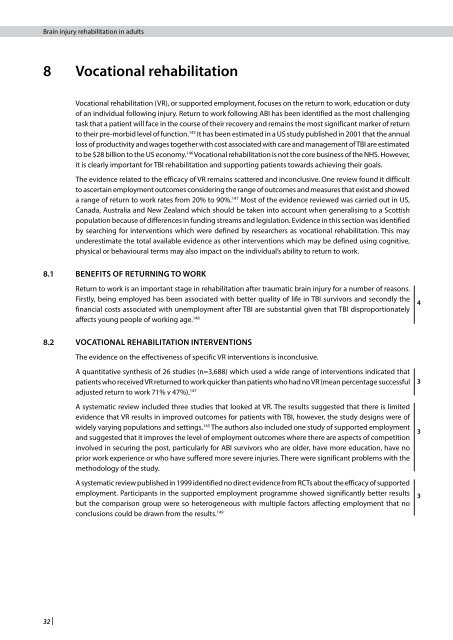sign130
sign130
sign130
Create successful ePaper yourself
Turn your PDF publications into a flip-book with our unique Google optimized e-Paper software.
Brain injury rehabilitation in adults<br />
8 Vocational rehabilitation<br />
32 |<br />
Vocational rehabilitation (VR), or supported employment, focuses on the return to work, education or duty<br />
of an individual following injury. Return to work following ABI has been identified as the most challenging<br />
task that a patient will face in the course of their recovery and remains the most significant marker of return<br />
to their pre-morbid level of function. 145 It has been estimated in a US study published in 2001 that the annual<br />
loss of productivity and wages together with cost associated with care and management of TBI are estimated<br />
to be $28 billion to the US economy. 146 Vocational rehabilitation is not the core business of the NHS. However,<br />
it is clearly important for TBI rehabilitation and supporting patients towards achieving their goals.<br />
The evidence related to the efficacy of VR remains scattered and inconclusive. One review found it difficult<br />
to ascertain employment outcomes considering the range of outcomes and measures that exist and showed<br />
a range of return to work rates from 20% to 90%. 147 Most of the evidence reviewed was carried out in US,<br />
Canada, Australia and New Zealand which should be taken into account when generalising to a Scottish<br />
population because of differences in funding streams and legislation. Evidence in this section was identified<br />
by searching for interventions which were defined by researchers as vocational rehabilitation. This may<br />
underestimate the total available evidence as other interventions which may be defined using cognitive,<br />
physical or behavioural terms may also impact on the individual’s ability to return to work.<br />
8.1 BENEfITS of RETuRNING To WoRK<br />
Return to work is an important stage in rehabilitation after traumatic brain injury for a number of reasons.<br />
Firstly, being employed has been associated with better quality of life in TBI survivors and secondly the<br />
financial costs associated with unemployment after TBI are substantial given that TBI disproportionately<br />
affects young people of working age. 148<br />
8.2 VoCATIoNAl REHABIlITATIoN INTERVENTIoNS<br />
The evidence on the effectiveness of specific VR interventions is inconclusive.<br />
A quantitative synthesis of 26 studies (n=3,688) which used a wide range of interventions indicated that<br />
patients who received VR returned to work quicker than patients who had no VR (mean percentage successful<br />
adjusted return to work 71% v 47%). 147<br />
A systematic review included three studies that looked at VR. The results suggested that there is limited<br />
evidence that VR results in improved outcomes for patients with TBI, however, the study designs were of<br />
widely varying populations and settings. 145 The authors also included one study of supported employment<br />
and suggested that it improves the level of employment outcomes where there are aspects of competition<br />
involved in securing the post, particularly for ABI survivors who are older, have more education, have no<br />
prior work experience or who have suffered more severe injuries. There were significant problems with the<br />
methodology of the study.<br />
A systematic review published in 1999 identified no direct evidence from RCTs about the efficacy of supported<br />
employment. Participants in the supported employment programme showed significantly better results<br />
but the comparison group were so heterogeneous with multiple factors affecting employment that no<br />
conclusions could be drawn from the results. 149<br />
4<br />
3<br />
3<br />
3


